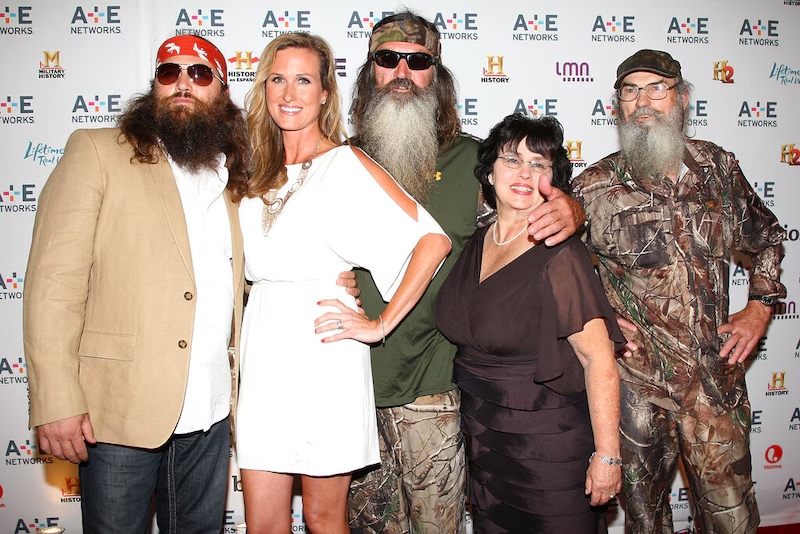Phil Robertson: A Life of Conviction, Faith, and Family Values
Phil Robertson is a man known across America for his unwavering convictions, deep-rooted faith, and commitment to a way of life many consider old-fashioned but undeniably powerful. While millions were introduced to him through the reality series Duck Dynasty, Robertson’s story runs much deeper than what television could capture. He is a hunter, entrepreneur, evangelist, and family patriarch whose influence stretches far beyond duck blinds and camo-clad antics.
From Humble Beginnings to National Recognition
Phil Alexander Robertson was born on April 24, 1946, in Vivian, Louisiana. Raised in a small home without modern conveniences, his early life was defined by simplicity and hard work. His family, though financially limited, maintained a strong sense of unity and resilience. These formative years instilled in him a work ethic and respect for the land that would guide him for decades.
As a young man, Robertson showed promise in athletics, eventually earning a football scholarship to Louisiana Tech University. He played quarterback, sharing the field with future NFL Hall of Famer Terry Bradshaw. Despite the potential for a professional sports career, Robertson felt a stronger pull toward the outdoors and a life centered around hunting and fishing. Turning away from fame and money at an early age was one of the first major decisions that reflected the independence he would become known for.
The Birth of Duck Commander
Robertson’s true breakthrough came not through athletics or media, but through a duck call. Disappointed by the quality of calls available in the market, he invented his own in 1972, founding the company Duck Commander. His invention mimicked the sound of real ducks with greater accuracy than existing products, quickly gaining popularity among hunters.
What started as a small family operation grew into a successful business. The company’s growth was driven not just by the quality of the product, but by the authenticity of the Robertson family itself. They lived the lifestyle their customers respected. Hunting was not a sport to them—it was a way of life, a tradition passed down through generations.
Family as the Cornerstone
Family has always been at the center of Phil Robertson’s world. He and his wife, Kay, married in 1966 and raised four sons: Alan, Jase, Willie, and Jep. The Robertson household was steeped in values that emphasized faith, personal responsibility, and the importance of staying grounded.
Phil’s journey wasn’t without hardship. In his early adult years, he battled alcoholism and reckless behavior, nearly losing everything in the process. It was during this dark period that he experienced a spiritual transformation. Embracing Christianity, he rebuilt his life and his relationships, becoming a vocal proponent of redemption and second chances.
His conversion marked a turning point, not only for his personal life but for the legacy he would build. As he embraced his new path, he became a preacher, often sharing his story of brokenness and recovery in churches and events around the country. His message is clear: no one is beyond hope, and change is possible through faith and personal accountability.
Duck Dynasty and the Rise of a Cultural Icon
In 2012, Duck Dynasty premiered on A&E and quickly became a cultural phenomenon. The show featured the Robertson family’s business, personal lives, and humorous interactions, drawing millions of viewers every week. At the heart of the show was a celebration of Southern traditions, family bonds, and Christian faith.
Phil stood out for his candid nature and old-school wisdom. His long beard, camouflage clothing, and down-to-earth demeanor became iconic. More importantly, his moral clarity and refusal to conform to societal trends made him a polarizing yet admired figure.
Although Duck Dynasty concluded in 2017, its impact on popular culture remains significant. The show didn’t just entertain; it provided a counter-narrative to mainstream media, spotlighting a family that honored tradition and held to its beliefs.
A Voice for Traditional Values
Phil Robertson’s public persona extends beyond television. He has authored several books, including Happy, Happy, Happy and The Theft of America’s Soul, in which he outlines the moral and spiritual challenges he believes America faces. In these writings, he calls for a return to Biblical principles, urging readers to resist cultural pressures that dilute personal responsibility and faith.
His commentary, often delivered through his podcast “Unashamed with Phil Robertson,” has made him a prominent voice in conservative and faith-based circles. He addresses political, social, and spiritual topics with a mix of blunt honesty and scripture-based insight. His opinions are not universally accepted, but he doesn’t aim to be agreeable—he aims to be truthful, as he understands it through his faith.
Faith as the Foundation
If there is one consistent theme in Phil Robertson’s life, it is the centrality of faith. Christianity isn’t just a belief system for him; it’s the foundation upon which he has built every aspect of his life. From how he runs his business to how he raises his children and engages with the world, his choices reflect his understanding of the Gospel.
He frequently speaks about the importance of living according to divine principles rather than chasing worldly success. He emphasizes humility, repentance, and service to others. While his approach can be direct, even confrontational, his goal is transformation, not condemnation.
Legacy and Influence
Phil Robertson’s legacy is not limited to business success or television fame. It is found in the millions of people who have been encouraged by his message of redemption. It is seen in his children and grandchildren, many of whom have followed in his footsteps by embracing faith and family leadership.
He has influenced discussions on masculinity, parenting, personal responsibility, and national identity. His life challenges assumptions about what it means to be successful, suggesting that peace and purpose are found not in material wealth but in spiritual clarity and strong relationships.
Conclusion
Phil Robertson is more than a celebrity—he is a testament to what can be achieved when a person remains grounded in values, faith, and family. His story is one of transformation, conviction, and courage in the face of changing cultural tides. Whether speaking to a stadium crowd or spending a quiet morning in the duck blind, Robertson stays true to who he is.
In a world that often rewards compromise, Phil Robertson offers a different model—one that encourages standing firm, speaking truth, and living a life of purpose.




